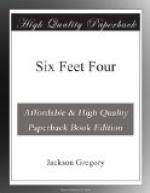He nodded to a few men, spoke to fewer, for here was he more a stranger than he was in Dry Town. Riding straight to the Brown Bear Saloon he swung down. He left his horse, trained to stand by the hour for him, at the edge of the board sidewalk, the bridle reins caught around the horn of the saddle, moved at an even pace through the men at the door and went inside.
A dozen men stood at the long bar, big men and little, dark men and light, of this nationality and that, but alike in the one essential thing that they were of the type by which the far-out places are wrested from the wilderness of God and made part of the wildness of man, hard men of tongue, of hand, of nature, hard drinkers, hard fighters. Gunmen, to the last man of them, who live with a gun always, by a gun often enough, who are dropping fast before the onrush of the civilization for which they themselves have made the way, but who will daily walk over their graves until the glimmer of steel rails runs into the last of the far places, until there be no longer wide, unfenced miles where cattle run free and rugged mountain sides into which men dip to bring out red and yellow gold.
Thornton’s eyes ran down the line of them, swiftly. There was no man there whom he knew. He stepped a little to one side, the door at his left, the bare front wall at his back. He stood loosely, carelessly to judge from the little slump of the shoulders, the burning cigarette in the fingers of his left hand, the thumb of the right hand caught in his belt.
The bar was at his left, the bare floor running away in front of him, sawdust covered, the string of gaming tables stretched along the wall at his right. As by instinct his eyes lighted upon the man whom he sought. First a round topped table where three men cut and dealt at “stud”; then a faro lay-out with its quick-eyed dealer, its quick-eyed look-out upon his stool, its half dozen men playing and looking on; then the “wheel”; then a second table with six men busy at “draw.” There, at this table, with his broad back to him, sat the Kid. And as usual, to complete the youthful swagger of him, he wore his two guns in plain sight.
Still the cattle man made no move, still his eyes ran back and forth, seeking, showing nothing of what they sought or of what they had found already. He marked every man in the place; saw that there were only two of them besides the Kid whom he had ever seen before, one the bartender, one a man with whom he had had no dealings; noted that neither Charley nor Ed Bedloe were in the house. He saw too that the bartender had leaned a little over his bar, saying something swiftly to the man whom he was serving; that the man turned curiously to look toward the door; while at the same time the man across the table from the Kid had given warning, and the Kid’s hands had come away from his cards, dropping down into his lap.
Then Thornton came on, walking slowly, passing about the first poker table, then by the faro table, the roulette wheel, and finally to the table where the Kid sat. Bedloe had not moved again: he had not turned, his cards lay unheeded before him. The other men were silent with a jack pot waiting for their attention.




